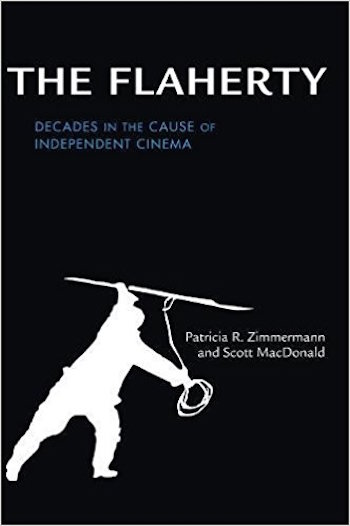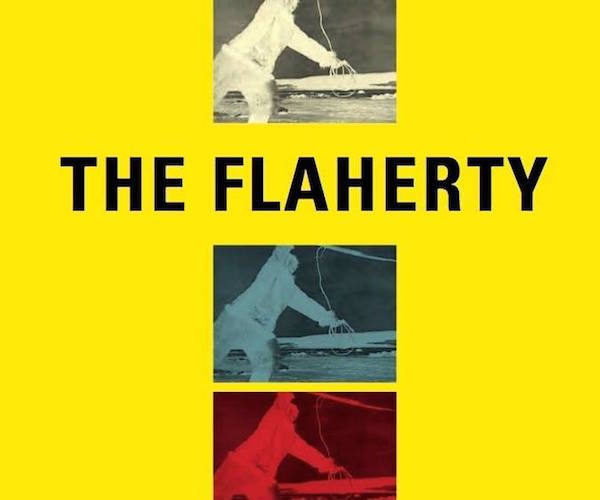Book Review: “The Flaherty Seminar” — A History of Cinematic Contention
It’s probably unfair, but attending the Flaherty, I kept seeing in my mind the pig Napoleon and his attack dogs in George Orwell’s Animal Farm.
By Gerald Peary

I came to the Flaherty Seminar extraordinarily late, the summer of 2016, considering it’s been about since 1955, considering attending is on the bucket list of every documentarian, everyone writing and/or teaching about documentaries. However, I’m not sure that I ever want to attend again. My traumatic reaction to my week there cannot help but affect my reading of The Flaherty: Decades in the Cause of Independent Cinema (Indiana University Press, $41), co-authored with intelligence and care by two esteemed film scholars, Patricia R. Zimmermann and Scott MacDonald.
The Seminar is named after the pioneering documentarian, Robert Flaherty, famous for Nanook of the North, Moana, and a handful of other non-fiction classics. He died in 1951. Four years after, his widow, Frances Flaherty, initiated an annual summer seminar in honor of her spouse’s filmmaking to be held in Dummerson, Vermont, at the family farm. That’s also where he’s buried, on the property under a large rock.
Probably the first object of this book of exemplary scholarship is to give Frances Flaherty her due, to make it clear to one and all that the Flaherty Seminar only exists because Mrs. Flaherty willed it to be and kept it going. And to dispel the persistent myth that Robert Flaherty himself somehow — from the grave? — was the one who originated it. Patricia Zimmermann, a feminist film historian and theorist, wrote the text of the book, and she makes a formidable case that Frances was a major contributor to Robert Flaherty documentaries. She was deeply involved in many phases of production, though she’s totally absent in the credits. As often, looming behind the “great” modernist artist is a woman of consequence.
One might have hoped that, when widowed, Frances fought for placing her name where it belonged on the Flaherty movies. Instead, in pre-feminist days, she used her strengths and wiles to build up even more the hallowed name of her husband. In its first years, the Flaherty Seminar was a retreat where, with Frances’s planning, “a mix of distributors, filmmakers, librarians, museum curators, students, and writers” saw many nights in a row Robert Flaherty documentaries, and where the lengthy discussions were of these movies. The filmmaking guests were often those who’d worked on Flaherty films, like Richard Leacock, cameraman on The Louisiana Story, or those who made documentaries clearly indebted to Robert Flaherty, in the Flaherty tradition.
Meanwhile, Frances Flaherty was developing her own myths about her late husband, creating a persona for him which was a projection of her infatuation with Zen Buddhism. Frances had much to say about what she called “the Flaherty way,” his going “against the current—the mighty Niagara—of the commercial cinema…” Flaherty’s films were poetic, artisanal, and, most important, never preconceived. They were created almost mystically in the editing room, like an Inuit slowly finding a shape carved on a piece of rock.
So that’s where the Flaherty Seminar began, with the worshipping of one film artist, his credos, his way of working, his cinema. Seemingly everyone who attended the early seminars was in agreement with its walled-in purposes. The seminars were friendly, utopian, summer places, also shrines to Robert Flaherty’s supposedly masterly filmmaking.
Oh, did all of that change. In the years hence, the Seminar moved from the Flaherty estate to outside venues. It expanded from just studying Robert Flaherty to bringing in all kinds of filmmakers. In the years before her 1972 death, Frances Flaherty uncomfortably abdicated her power of setting the agenda, as other programmers, and other executives came to lead the Seminars. Most important was Willard Van Dyke, himself a highly regarded documentarian and an adminstrator in the film program at MOMA. In charge of the Flaherty, he reached out to filmmakers of social conscience and social interest, who were anathema to Frances’s apolitical world view. But Van Dyke did something even more important: a cocky, abrasive man, he changed the tone of the Flaherty from filmmaker worship to a place of disputation and conflict, where fiercely arguing about documentary became the nature of the day. Arguing and criticizing in the most harsh, impolitic way.
Half a century later, when I attended the 2016 seminar at Colgate University, the Willard Van Dyke attack mode was still operative, still embraced with relish, especially by young scholars additionally armed with political correctness, advanced film theory, and identity politics. Was I paranoid to believe that I was seen (mostly not seen, invisible) as the Old White Man in the room, whose 45 years in film was totally irrelevant? A young Mexican woman studying at Harvard took me aside to complain that she noticed I was always referring to myself as an “American.” I should always say, she lectured me, that I’m a “North American.” Another young woman angrily accused me, when I dared discuss a film with her over lunch, of partaking of the dreaded “male gaze.” And more. And more.
How did I react to this atmosphere of poisonous criticism? I was sputtering, bursting with rage, appalled at the narrow-minded political correctness. After decades as a college professor, I completely lost my voice.
And the poor filmmakers! A kindly German feminist made the fatal error of showing a little documentary memoir she shot of street scenes as she traveled about India. I still see the tears in her eyes, as the audience gleefully pounced on her for making “touristic porn,” for being the worst kind of colonialist and imperialist.

I program the Boston University Cinematheque. I bring in filmmaker guests and always ask them tough questions. But I’m also courteous, never consciously mean or hurtful. It’s probably unfair, but attending the Flaherty, I kept seeing in my mind the pig Napoleon and his attack dogs in George Orwell’s Animal Farm.
Scott MacDonald, Zimmermann’s co-author on The Flaherty, gave himself the important assignment of going through an archive of Flaherty discussions with filmmakers and resurrecting the most salient Q and A’s. There is lots of terrific material here, juicy talks with highly articulate seminar guests. I’ll admit that my obsessive interest reading them was to see how filmmakers reacted when they were stupidly vilified.
Canadian gay activist, John Greyson, wrote a poem about his awful experience: “The crowd was riled/my back was tense/The questions were hostile in the extreme/ “exploitation” and “degradation”/ “Objectivism and ‘Obscene.” San Francisco underground filmmaker, George Kuchar, the gentlest of souls, revenged himself against being victimized at the Flaherty with a short, “Vermin of the Vortex.” In the film, Kuchar is abducted by aliens who, to his horror, drop him at the Seminar. And then there was experimentalist Ken Jacobs who, screaming, “FUCK YOU! You disgusted creeps!” walked out of the unhappy discussion of his cinema.
Was I there for a particularily creepy, malicious Flaherty year? Zimmermann’s and MacDonald’s book doesn’t hide that there’s a certain mean-spiritedness built into the Flaherty DNA. Still, this is a pro-Flaherty tome. The co-authors amply demonstrate that there’s much to appreciate about the Flaherty history, 55 years of discovering and celebrating independent cinema and independent filmmakers from around the world. Ideally, Zimmermann writes, the Flaherty is “a panoply of carefully curated, hard-to-access films contextualized by lengthy discussions and skillful moderation.”
Gerald Peary is a retired film studies professor at Suffolk University, Boston, curator of the Boston University Cinematheque, and the general editor of the “Conversations with Filmmakers” series from the University Press of Mississippi. A critic for the late Boston Phoenix, he is the author of nine books on cinema, writer-director of the documentaries For the Love of Movies: the Story of American Film Criticism and Archie’s Betty, and a featured actor in the 2013 independent narrative Computer Chess.
Tagged: Flaherty Seminar, Indiana University Press, Patricia R. Zimmermann, Robert Flaherty, Scott MacDonald, documentary

This is a well-written, powerful review in which the author manages to keep his cool sufficiently to record the barbed nonsense coming out of mouths of “young scholars . . . armed with political correctness, advanced film theory, and identity politics.”
I’m not sure I kept my cool, but thanks, Harvey.
Hmmm – I think a handful of times I sent the Flaherty folks a film, and a handful of times I got the standard “nope.” That, along with a lot of other things in my erstwhile film life led me to conclude I’d landed on some vague shit/black list. My guess is that yes, in some way…. But, on reading Gerry’s description here of his and prior visitors experiences, I am quite glad I was spared the opportunity. I gave up some years ago even thinking of “applying” for this ostensibly prestigious workshop, but even so, thanks for the heads-up, Gerry.
You shouldn’t have had to send your films for approval, Jon. It’s amazing to me that The Flaherty in all its manifestations and with all its curators never once invited you to be one of their featured filmmakers. As Bunuel said, “This is not the best of all possible worlds.”